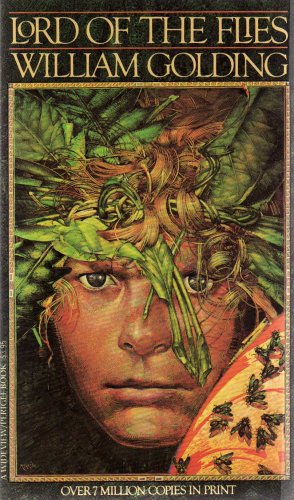All Nonfiction
- Bullying
- Books
- Academic
- Author Interviews
- Celebrity interviews
- College Articles
- College Essays
- Educator of the Year
- Heroes
- Interviews
- Memoir
- Personal Experience
- Sports
- Travel & Culture
All Opinions
- Bullying
- Current Events / Politics
- Discrimination
- Drugs / Alcohol / Smoking
- Entertainment / Celebrities
- Environment
- Love / Relationships
- Movies / Music / TV
- Pop Culture / Trends
- School / College
- Social Issues / Civics
- Spirituality / Religion
- Sports / Hobbies
All Hot Topics
- Bullying
- Community Service
- Environment
- Health
- Letters to the Editor
- Pride & Prejudice
- What Matters
- Back
Summer Guide
- Program Links
- Program Reviews
- Back
College Guide
- College Links
- College Reviews
- College Essays
- College Articles
- Back
Lord of the Flies by William Golding
Lord of the Flies by William Golding is slightly disturbing but nonetheless a great novel, not necessarily from an “I'm going to read this all the time!” standpoint, but more from an “I wish I could write like that!” perspective. This book was originally published in 1954; it is one of the most carefully structured novels I've read; each chapter has an awesome plot to it, and the metaphors are amazing.
In the beginning of the novel, the reader is introduced to a group of British boys who have been stranded on a tropical island. The boys are all young, the oldest ones not and older than twelve, and the island is seemingly beautiful and peaceful. It seems as if the boys may have a wonderful time in paradise, but as disagreement breaks out among them, their life on the island becomes increasingly violent and unpredictable.
On a symbolic level, the novel deals with the effects of war on the human race and the ways in which it can turn Earth, our own used-to-be-paradise, into a living hell.
Ralph is in many ways the personification of a good-intentioned world leader who must struggle with himself between enforcing the law and giving in to his instincts.
Ralph realizes the necessity fir a structured environment for the boys who look up to him, even if they don't think it necessary, but at the same time he wants to give in to his own selfish desires, Ralph does not have the inborn charisma of a “natural” leader, but hi is the most capable leader amongst the boys. He has the conch, which Golding uses as a symbol of leadership and just government. He is not perfect, but he has a sense to ask advice from boys (such as Piggy) who know more than he does.
Piggy represents the weakened intellectual; his obesity and asthma prevent him from playing and working with the other boys. His isolation and alienation due to his physical problems and his sheltered life with his aunt mirror the separation and alienation of some in the community, from mainstream world affairs.
Roger represents the senselessly violent groups who are suppressed by the laws of a stable society but who rise to the bloodthirsty heights in times of war.
When the boys first arrive on the island, Roger is shy and furtive. When war breaks out between the boys, he comes to the forefront as the main enforcer for Jack, the boy tyrant, Roger's methods of terror and sues of torture mirror the actions of groups such as the Nazis in the wartime of Germany. Roger vents his anger on his fellow island mates, representing genocide within a country.
Jack Merridew represents both tyranny and the destructive, reckless side of the human race. He has a great deal of charisma but very little foresight; his view of the world is centered on satisfying his own desires for power and pleasure.
Most of the other boys can only see his charisma, and his military bravado makes him seem like the natural leader to follow. But in reality, Jack is a very poor leader, providing only quick, superficial answers to their problems. When his answers fail, he maintains his hold on the boys with terror and a cult of bloodlust that refocuses the energy of their fears into wild dances and pig hunts. Jack denies his own fears and humanity, hiding behind a mask of war paint.
Similar Articles
JOIN THE DISCUSSION
This article has 0 comments.

